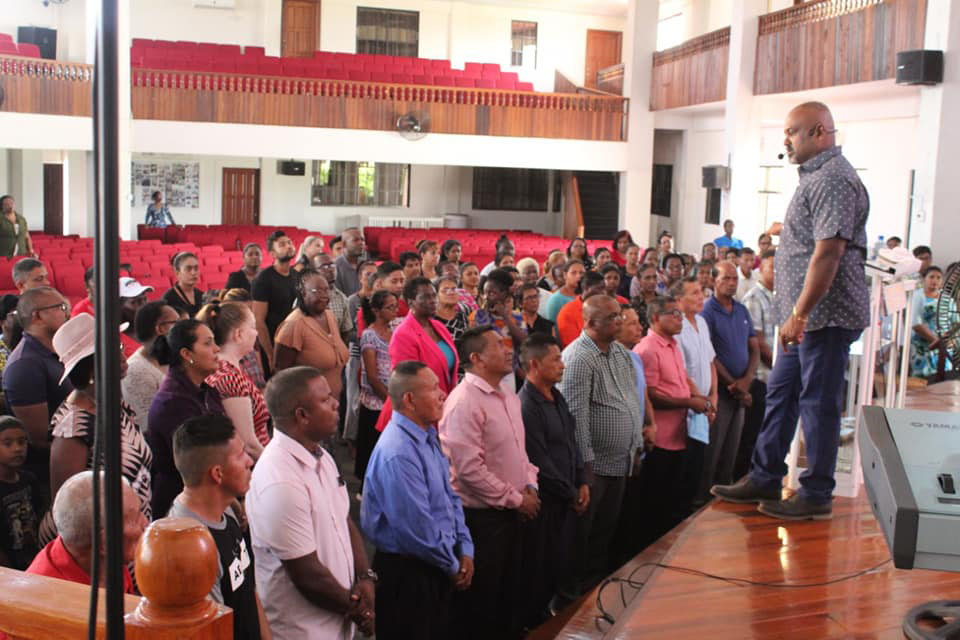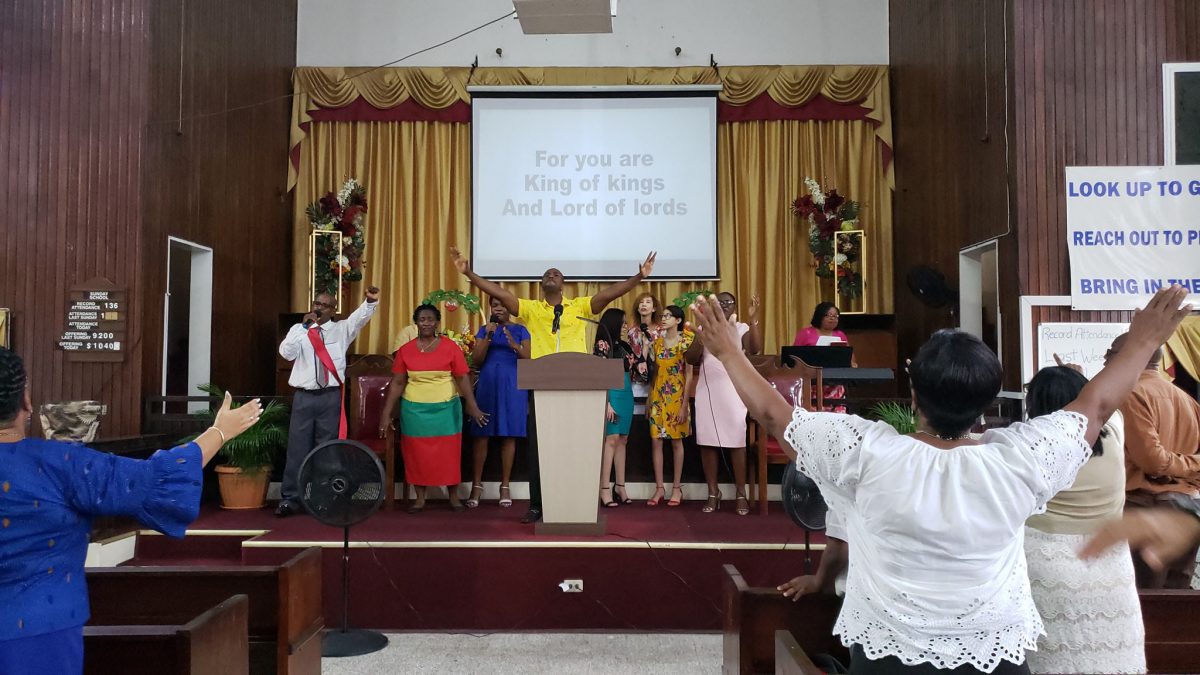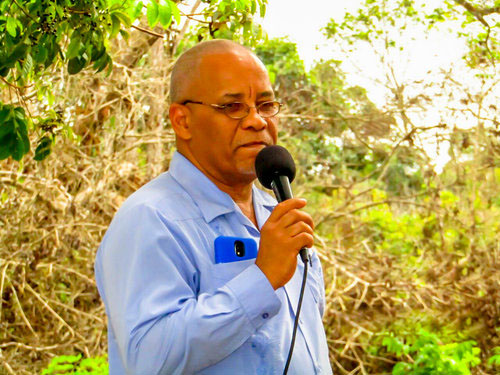Prevented from holding gatherings as part of the measures put in place to prevent the spread of the new coronavirus disease (COVID-19), many churches have started to utilise online platforms to continue to spread their messages to their followers.
The untraditional services often take the form of a live broadcast on Facebook or a broadcast of sermons filmed prior to the airing date. Some also share their broadcasts by radio and television, all in the hopes of reaching persons all across Guyana.
During a telephone interview with Stabroek Weekend, Ministerial Pastor at the Central Baptist Church Aslyne Luke explained that at a time when uncertainty reigns heavily in the hearts of many congregations, it is the church’s duty to assist with spiritual guidance. “We [the church] have always paid interest in getting the word of God out to persons. This has also helped to develop an online following for worshippers. It has made the church realise that it is important to have the messages spread further. There is always a need for people to be offered spiritual guidance, that’s the responsibility of the church in the society, especially in the times of darkness so to speak. The inability to meet and engage with people the way we normally would, meant that we had to find some other way,” the pastor said.
The services are not only reaching the ears of Guyanese as Luke also mentioned that his online teachings are reaching listeners all the way in London.
Luke explained that they record sermons in the church office or in the auditorium and post it to their Facebook page. At the moment, the sermons are scheduled for 9 am on Sundays. This is the normal time when members previously congregated for the weekly Sunday service. He added that the church also produces a twice weekly programme aired on NCN radio during the week.
The church has also resorted to using Soundcloud (https://soundcloud.com/aslyne-elson-a-luke) and WhatsApp to reach church members. However, the only available message bearing visual footage of the pastor is the video which is posted to the church’s social media on Sundays.
Luke said that the messages are filmed and edited a day or two prior to the upload for the Sunday morning broadcast. After airing the broadcast is then saved to the Central Baptist Church’s Facebook page so that persons who are late or unavailable at the time it is aired can access it. “If they can’t get it live, it’s always there and they can look at it later, which is what happens a lot of times because we’ve noticed that sometimes the actual live broadcast will maybe get 60 or 70 persons, or so. But by the end of the week we will find that the number of likes and views would have increased exponentially,” the pastor related. He mentioned that the comments made during the live broadcast are often indicators of how many persons tune in at the time it is uploaded. He assured that efforts are being met with great pleasure since persons are tuning in, whether it be at the time of the broadcast or later, when persons are available to properly view it.
Luke said that the initial approach was a live broadcast, but certain limitations like slow internet in the country made the church reconsider. It was soon realised that prerecording was the best approach and this has so far worked out. Luke added that for the past 18 years the Central Baptist Church has been airing sermons through NCN radio. Previously, the sermons would be prerecorded in a studio at the radio station but as of late the church has resorted to its own devices and simply delivered the prerecorded product to the radio station.
Another church which has been seeking to maintain a presence since sharing its services online is the Eccles Assembly of God church, one of the World Assemblies of God fellowship churches in the country. Bishop Michael Pereira, during a telephone interview, explained his church’s new approach to bible study. To start, Pereira said, the weekly service is prerecorded before it is broadcast on the Church’s Facebook page. He said that by using a prerecorded broadcast, he is assured that it won’t be interrupted during the streaming. The same prerecorded broadcast is then rebroadcast on MTV Channel 14/ Cable 65 for persons who don’t have ready access to the internet.
Pereira said that he has found that the online approach has received tremendous response but noted that the church has always had a fair number of persons in attendance. But he said that taking the church online has given many other persons who would otherwise not be accessible to the church’s teachings, a chance to receive the gospel. And while the church is still transitioning to the change from physical sermons to virtual sermons, he said that the advantages outweigh the disadvantages. One of those disadvantages being the lack of interaction with the congregation.
Currently, the church offer two church services every week. The first is the Bible study which is conducted on Thursdays in the evenings and the Sunday morning church service which starts around 9.30, the same time it was held prior to the restrictions on gatherings.
Other churches have also increased their Facebook presence, including the Better Hope Assembly of God and the People’s Assembly of God. The Methodist Church has also taken to Zoom for online services and so has the Moravian Church.
A Sunday school teacher from the Lifespring Ministries also shared his experience transitioning to video recording in an empty church as the pastor preaches to an absent congregation during the filming of Pastor Balgobind Ragnauth’s sermons. “It different, it’s kind of hard because most people used to be there but now it’s an empty church. I just think it’s amazing and mind blowing watching how he does it because the church is empty when we film and then when I re-watch it after its uploaded…,” Marlon Johnson trailed off as he explained the church’s new normal.
Johnson said that the change to virtual services has been hard for not only him but other persons attached to the church. “A lot of people say they miss church they miss being anointed with oil. It’s the same thing you have your faith and what’s not but just being there at the altar is a whole different atmosphere,” he revealed. “There’s a void that is not being filled from at home,” he added.
The Lifespring Ministries continues to host its services on Sundays at 10 am and Tuesdays at 6.30 pm as it used to before going online. The now pre-filmed sermons are uploaded to both the church’s Facebook page and YouTube channel.
Bridge the gap but…
Like Johnson, some churchgoers have also been finding it hard to make the adjustment to online services. Faith Phillips, who is a member of the Faith Tabernacle Assembly of God Church, said “So far it’s good… but I miss it, you know, actually being there at church,” she confessed, “But it’s still a way to bridge the gap and continue to have the fellowship,” she added.
She explained that for “Keeping the young people in check, we use Zoom for youth fellowship and they’re comfortable with this. Zoom services are also used for the bible study and prayer meetings. On Wednesdays the bible study starts at 7pm and on Fridays we have our prayer meeting, this starts at 7 pm. On Sundays we have the usual morning services at 8 and then in the evening we have youth Ministries at 7.”
Daniel Yearwood, who is the assistant to the literature servant at the Kingdom Hall of Jehovah’s Witnesses, said “In my experience, live streaming church services is a very good and effective alternative, considering the restrictions of COVID-19. It’s been a whole new experience for me. On one hand, it’s great to enjoy service in the comfort of my home. On the other hand, I don’t get the same feeling of happiness as I do when I’m there with my brothers and sisters in person.” The 19-year-old explained that the online route taken has made church accessible for days when you’re not feeling well and also praised the Zoom app for having multiple settings which provide for a comfortable online experience. “One thing I love about it is that I am able to attend even when sick,” he said, while noting that attendance and participation has been remarkable.
However, the youth also touched on the challenges of online church.
“Of course, it has its fair share of disadvantages. For instance, lack of a good Wi-Fi connection can cause the audio and video quality of the programme to be very poor and buffer a lot. Usually, one of my favorite parts about church is getting to communicate with members before and after services. This has really been a challenge for me since online services comes with the very little physical interaction and it gets really confusing when everyone is trying to talk at the same time. Another gripe I have with online services is that sometimes I can feel very insecure in front of a camera but I’m slowly getting accustomed to it,” he explained. “Overall, I will say once you get used to it, it becomes very easy and simple. I am very thankful for this online method of service in these dark times,” Yearwood added.
Yearwood said that the church hosts its usual Sunday morning services at 10 am and this lasts for an hour and 45 minutes, while the Thursday evening service starts at 6pm and comes to an end at 8.15 pm.
Meanwhile, a member of one of the Guyana Conference of Seventh Day Adventists Church, also shared her experience with virtual worship services.
“The transition [from physical to virtual worshipping] is not easy. Some persons are still not as involved because of accessibility. It’s very difficult because you’re not getting to interact with your brother, you are not seeing them because some of them, their cameras might be off but you know they are there. [So] it is a period of adjustment and it is what we have to do if we want to at least keep the congregation together. The flock still needs to be fed,” were the words of the woman, who asked to be identified as Marissa. “You know persons’ spiritual needs still need to be met. There are those who might need special prayers. That’s where these services come into play,” Marissa explained, while adding that the reason she believes the churches have taken an online approach rather than closing the church.
Marissa said that the Guyana Conference of Seventh Day Adventists has many churches across the country and each church has its own service. The one she is a part of is based on the East Coast of Demerara and it hosts its services with the help of the Zoom app, which allows for interactive live streaming. Additionally, she said that the church has been holding church services on Wednesdays, Fridays and Sundays since April and the online turn out is often large.
“Our main services are held on Sundays, Wednesdays and Fridays and the morning Sabbath. We also have children’s services. We have discussions on the Zoom app [and] this includes a bible study and since it has been almost two months, persons who want to be baptised or recently baptised have been able to join,” the woman said.
She added that some persons have requested to be baptised so they can be a part of the congregation and have been attending virtual services, which enabled them to properly prepare themselves for the born again life. Some have also went through the baptism process all while attending the virtual services.









